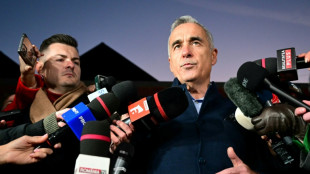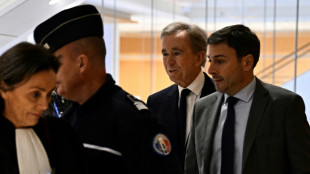
-
 In Lebanon's Tyre returning residents find no water, little power
In Lebanon's Tyre returning residents find no water, little power
-
Protests in Georgia after PM delays EU bid to 2028

-
 Biden slams Trump tariff threats as 'counterproductive'
Biden slams Trump tariff threats as 'counterproductive'
-
TikTok tactics shake up politics in Romania

-
 'He should do comedy' says Norris of Verstappen comments
'He should do comedy' says Norris of Verstappen comments
-
Americans celebrate Thanksgiving after bitter election

-
 Flood-hit Spain introduces 'climate leave' for workers
Flood-hit Spain introduces 'climate leave' for workers
-
UK's Starmer vows to slash net migration

-
 Recount order, TikTok claims throw Romania election into chaos
Recount order, TikTok claims throw Romania election into chaos
-
Jansen stars for South Africa as Sri Lanka crumble to 42 all out

-
 Bottas set for Mercedes return as Mick Schumacher quits reserve role
Bottas set for Mercedes return as Mick Schumacher quits reserve role
-
Putin threatens Kyiv with new hypersonic missile

-
 Georgia delays EU bid until 2028 amid post-election crisis
Georgia delays EU bid until 2028 amid post-election crisis
-
French PM announces concession in bid to end budget standoff

-
 Guardiola's ingenuity will solve Man City crisis, says Slot
Guardiola's ingenuity will solve Man City crisis, says Slot
-
South Africa in control after Sri Lanka crash to 42 all out

-
 'Nothing left': Flood-hit Spanish town struggles one month on
'Nothing left': Flood-hit Spanish town struggles one month on
-
Israel conducts first strike on Lebanon since ceasefire

-
 'Unrecognisable' Mbappe and Real Madrid hurting after European woes
'Unrecognisable' Mbappe and Real Madrid hurting after European woes
-
Uber and Bolt unveil women-only service in Paris

-
 French cognac workers protest China bottling plan amid tariff threat
French cognac workers protest China bottling plan amid tariff threat
-
World tennis No.2 Swiatek accepts one-month doping suspension

-
 Suaalii to start for Wallabies against Ireland
Suaalii to start for Wallabies against Ireland
-
Farrell backs youngster Prendergast at fly-half for Aussie Test

-
 Suualii to start for Wallabies against Ireland
Suualii to start for Wallabies against Ireland
-
Camavinga joins Real Madrid injury list

-
 Australia passes landmark social media ban for under 16s
Australia passes landmark social media ban for under 16s
-
Nigerian president woos French investment on state visit

-
 Contentious COP29 deal casts doubt over climate plans
Contentious COP29 deal casts doubt over climate plans
-
PSG, Real Madrid toil as giants struggle to get to grips with new Champions League

-
 Lampard appointed manager of 'ambitious' Coventry
Lampard appointed manager of 'ambitious' Coventry
-
Liberian ex-warlord Prince Johnson dies aged 72

-
 K-pop band NewJeans leaves label over 'mistreatment'
K-pop band NewJeans leaves label over 'mistreatment'
-
Sri Lanka crash to record low Test total of 42 in South Africa

-
 Putin says barrage 'response' to West-supplied missiles
Putin says barrage 'response' to West-supplied missiles
-
Lebanon MPs seek end to leadership vacuum with January presidency vote

-
 Eurozone stocks lift as French political stand-off eases
Eurozone stocks lift as French political stand-off eases
-
French farmers wall off public buildings in protest over regulations

-
 France says ready for budget concessions to avert 'storm'
France says ready for budget concessions to avert 'storm'
-
Lampard appointed Coventry manager

-
 French luxury mogul Arnault defiant at ex-spy chief trial
French luxury mogul Arnault defiant at ex-spy chief trial
-
South Africa bowled out for 191 against Sri Lanka

-
 'Europe's best' Liverpool aim to pile pain on Man City
'Europe's best' Liverpool aim to pile pain on Man City
-
Hezbollah under pressure after war with Israel

-
 OPEC+ postpones meeting on oil output to December 5
OPEC+ postpones meeting on oil output to December 5
-
Zelensky slams Russia's 'despicable' use of cluster munitions in energy strikes

-
 One dead, thousands displaced as floods hit southern Thailand
One dead, thousands displaced as floods hit southern Thailand
-
Lebanon army deploys under Israel-Hezbollah ceasefire

-
 Imran Khan's wife Bushra Bibi emerges as Pakistan protest figure
Imran Khan's wife Bushra Bibi emerges as Pakistan protest figure
-
COP16 biodiversity talks to restart in February: UN


Modern art museum breathes new life into downtown Warsaw
Warsaw's new modern art museum building opened on Friday, a minimalist white concrete structure meant to revitalise an abandoned area of the Polish capital long-defined by an imposing Stalin-era palace.
Warsaw, a city of 1.8 million people, did not until now have a proper site for its modern art museum. Instead, the cultural institution showcased its collections at various temporary locations.
Compared by some to a shoebox, shipping container or bunker, the new museum building designed by US architect Thomas Phifer has been hailed by others as a pearl of minimalism.
Mayor Rafal Trzaskowski called the opening "a historical event" for both Polish art and the city.
"Warsaw has been changing very dynamically, but the city's centre had kept its look from a few decades ago," he told reporters on Thursday.
- Stalin's legacy -
Nazi Germany destroyed 90 percent of the Polish capital during World War II, leaving its downtown a ruin upon liberation.
The communists that came to power in the war's aftermath decided not to reconstruct the area and instead built the Palace of Culture and Science, a building of Soviet-sanctioned socialist realist architecture.
More than 230 metres (750 feet) tall, it was a gift from USSR leader Joseph Stalin that for many years dominated the Polish capital.
During the communist era, the palace served as the site of mass political gatherings.
After the fall of the Soviet Union, the large empty square in front of the building became a street market, then a large rundown parking lot -- all cut off from urban life by a wide avenue.
The square was until now "anything and everything", a ramshackle spot with no clear purpose, according to architectural historian Anna Cymer.
She said "Warsaw still hasn't been able to shed its heavy historical legacy" and "break the spell cast by Stalin".
"We are finally on track to bring life back to this part of the city for everyone's benefit," Cymer added.
"The museum marks a big step towards the creation of a real downtown area and a revitalisation of the neighbourhood."
- 'Light of Warsaw' -
For the architect of the nearly 20,000-square-metre museum, the choice of location was significant and "courageous".
"They could have picked any other site in Warsaw" yet they decided to make it "the first thing built that is next to the palace, with all of its history," Phifer told reporters.
"This will be the new voice and the new home, the new town square, the new forum, the new place to meet, to encounter art and to encounter each other."
The museum, which cost 700 million zloty ($170 million) to build, has floor-to-ceiling glass on its ground floor as an invitation to all to enter.
Inside, a double staircase leads visitors to the exhibition rooms -- for now, mostly empty, with only a dozen works shown before the permanent exhibition opens in February.
Over the next two weeks, the museum will celebrate its opening with various events, concerts, dance shows and workshops.
The building's whole interior is bathed in natural light, which Phifer said was intentional.
"The light of Warsaw, this light that defines this place, is beginning to weave into the experience of the art," he said.
J.Fankhauser--BTB
